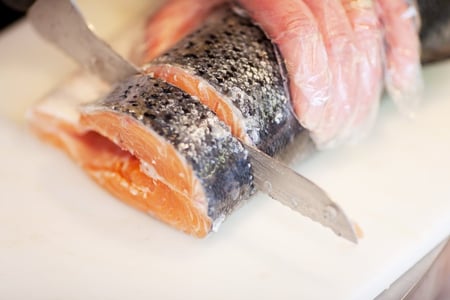
Food poisoning happens when you consume something that contains bacteria, a virus, a parasite or a toxin that causes your body to have a negative reaction. Food poisoning symptoms include nausea, vomiting, diarrhea, and stomach cramps. Adequate hydration is the most important aspect of treatment, regardless of if you are pregnant or not. Most food poisoning is mild and resolves without treatment. When you are pregnant, take the following food poisoning precautions.
Symptoms & Complications
Food safety is an extremely important issue for pregnant women because it can affect both mom and baby. Pregnant women are more vulnerable to food poisoning because of natural changes to their metabolism and circulation. According to the FDA, pregnant women are at a higher risk for foodborne illness because pregnancy alters their immune system. This alteration makes it harder for your body to fight off certain harmful foodborne microorganisms. The baby is also at risk because their immune system is not strong enough to fight off microorganism infections.
Additional symptoms of food poisoning during pregnancy include headache, fever, abdominal pain, dehydration, and bloody stool. Some of these symptoms may present like normal pregnancy symptoms or flu symptoms (nausea, vomiting), so it may be difficult to tell if you have food poisoning or not. It is helpful to look for symptoms that present themselves suddenly or feel abnormal. Eating contaminated food can trigger symptoms in as little as 20 minutes after digestion, in 1-3 days for some people, or as long as 6 weeks later (FDA). Exposure to elements such as methylmercury may take months before symptoms occur because methylmercury levels in the body may take time to accumulate (FDA).
The most common types of food poisoning include norovirus, listeria, E. Coli, and salmonella. Left untreated, these can be dangerous during pregnancy. If you experience symptoms of foodborne illness, contact your doctor immediately. Foodborne illness during pregnancy can cause serious health problems, miscarriage, premature delivery, stillbirth and even death of the mother. Different microorganisms can affect mom and baby in various ways. Sometimes food poisoning can make mom sick, leaving her dehydrated and exhausted. Other times mom’s symptoms can be mild, but she could unknowingly pass illness on to the baby who may experience serious effects from the foodborne illness. Foodborne microorganisms can cross the placenta and cause harm to the developing fetus and cause a wide range of health problems or even death.
Along with dehydration, food poisoning may lead to other, more severe complications. Norovirus can lead to malnutrition, listeria can cause long term neurological development for the baby, E. Coli can cause blood vessel lining damage or kidney failure (indicated by bloody stools), and salmonella has the potential to cause meningitis, reactive arthritis and bacteremia (Healthline).
Prevention & Treatment
Treatment for foodborne illness includes maintaining hydration, especially if symptoms include vomiting and diarrhea. It is important to ramp up water consumption during this time as fluid intake plays a huge role in how quickly the body recovers from illness. Your doctor may prescribe antibiotics to get rid of mom's infection and prevent infection to your fetus. Doctors may also give antibiotics to newborn babies who are born with foodborne illness.
Food safety and prevention of a foodborne illness is extremely important during pregnancy. There are precautions you can take to avoid getting sick. Four simple steps you can take to ensure food safety are:
- Cleaning hands and surfaces often
- Separating raw foods from ready to eat foods (don’t cross contaminate!)
- Cooking food to proper temperatures
- Refrigerating food promptly after serving
Some additional steps you can take to stay extra safe are limiting raw or unpasteurized dairy products, avoiding packaged meats, paying attention to expiration dates, and thoroughly washing fruits and veggies!
High Risk Foods
In addition to these preventative measures, learn the foods that are most likely to cause food poisoning. Raw or undercooked chicken, duck and turkey all have a high risk of causing food poisoning. Make sure you thoroughly cook poultry to the appropriate internal temperature (165 degrees).
Vegetables and leafy greens that are not properly washed have a high risk of illness. Make sure to thoroughly wash veggies before consuming.
Fish and shellfish are another common source of food poisoning. Fish that has not been stored at the correct temperature has a high risk of being contaminated with histamine (Healthline). Histamine is not destroyed by cooking temperatures and results in scombroid food poisoning. Fish also have a high risk of containing ciguatera fish poisoning. Shellfish also carry a risk of food poisoning because of the algae that shellfish eat produce many toxins that can accumulate in your body. Store-bought shellfish are usually safe to eat. Be sure to chill shellfish before use.
Rice is also a high-risk food for food poisoning as undercooked/uncooked rice can be contaminated with bacillus cereus spores. Cooked rice left standing at room temp can grow and multiply these spores. To reduce this risk, serve rice as soon as it is cooked and refrigerate shortly thereafter.
Deli meats such as ham, salami, hot dogs and bacon are other high-risk foods. It is important to store deli meat in the refrigerator and cook meat thoroughly before eating. Eggs that are consumed raw or undercooked also have a high risk of carrying salmonella and can cause illness.
References:
https://www.healthline.com/nutrition/foods-that-cause-food-poisoning#TOC_TITLE_HDR_11
https://www.healthline.com/health/pregnancy/food-poisoning
https://www.fda.gov/food/people-risk-foodborne-illness/what-foodborne-illness-food-safety-moms-be

Topics

Liz has been reading nutrition labels since she learned how to read. Growing up with severe peanut and tree nut allergies she learned that it’s important to know what you are putting into your body. She made her first big lifestyle change as a freshman in high school, when she decided to become a vegetarian. However, it wasn’t until she took a food class in Italy as part of a study abroad program in college that it clicked in her mind that she wanted to make food and nutrition her career. Liz graduated from Penn State University in 2015 with a bachelor's degree in Nutrition, as well as a bachelor's degree in Marketing. She completed her dietetic internship with Aramark in Philadelphia, and her master's degree at Northeastern University shortly after.



